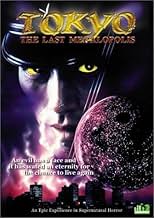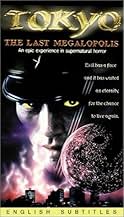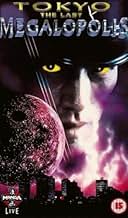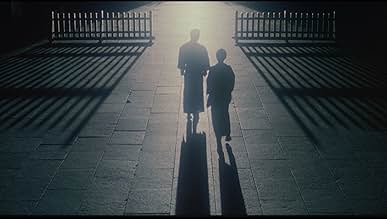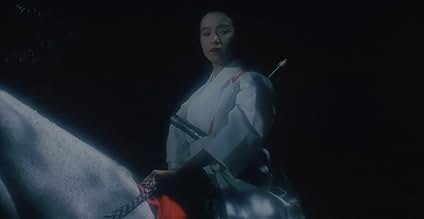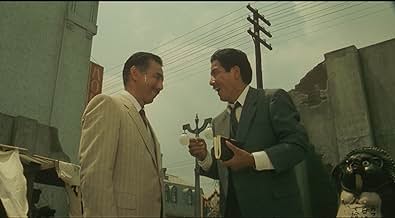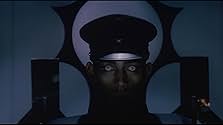A demonic reincarnation of a Japanese general from the 10th century appears in the early 20th century Tokyo with a mission to destroy the blooming city.A demonic reincarnation of a Japanese general from the 10th century appears in the early 20th century Tokyo with a mission to destroy the blooming city.A demonic reincarnation of a Japanese general from the 10th century appears in the early 20th century Tokyo with a mission to destroy the blooming city.
- Director
- Writers
- Stars
- Awards
- 2 nominations total
Jun'ichi Ishida
- Yoichiro Tatsumiya
- (as Junichi Ishida)
Bunshi Katsura VI
- Shigemaru Kuroda
- (as Sanshi Katsura)
Tamasaburô Bandô
- Kyoka Izumi
- (as Tamasaburo Bando)
- Director
- Writers
- All cast & crew
- Production, box office & more at IMDbPro
Featured reviews
I was really hoping to get into this more than I did. It feels like all the ingredients were there, but it feels too long to be a fun and direct genre movie, but not long or deep enough to satisfy as an epic.
That being said, part of my lack of enjoyment may come from not knowing enough Japanese history or folklore - I feel like knowledge there might help.
The only other issue was the way it was filmed. To me, lots of the framing was kind of weird, and it distracted me in a bad way at certain points throughout.
Still, at least Tokyo: The Last Megalopolis has fun ideas, entertaining special effects, and good scenes here and there. It definitely wasn't all bad, but I also wasn't crazy about it. I will inevitably think about it whenever I read about Francis Ford Coppola's upcoming film, though, thanks to the similar titles.
That being said, part of my lack of enjoyment may come from not knowing enough Japanese history or folklore - I feel like knowledge there might help.
The only other issue was the way it was filmed. To me, lots of the framing was kind of weird, and it distracted me in a bad way at certain points throughout.
Still, at least Tokyo: The Last Megalopolis has fun ideas, entertaining special effects, and good scenes here and there. It definitely wasn't all bad, but I also wasn't crazy about it. I will inevitably think about it whenever I read about Francis Ford Coppola's upcoming film, though, thanks to the similar titles.
Legendary Japanese director Akio Jissoji's quite literally ground-breaking, brain-boggling 'Teito Monogatari' aka 'Tokyo - The Last Megalopolis' is a breathtakingly imaginative Japanese Sci-fi fantasy epic about the ancient malevolent spirit of Taira No Masakado, a truly terrible, awesomely powerful spirit fitfully interred beneath an ever-expanding Tokyo, this vile despotic entity damned for heinous crimes against humanity, its alien slumbering being dangerously disturbed by no less maniacal demon psychic Yasunori Kato (Kyusako Shimada), whose unspeakably malign plan to rouse this monstrous being, and desolate Tokyo can only be thwarted by benign magic of beautiful metaphysical warrior Tatsumiya Keiko (Mieko Harada).
Seamlessly incorporating a dazzling array of special effects, featuring especially dextrous hand puppetry, vivid animatronic illusions, sublime stop-motion animation, and some striking, idiosyncratic designs by H. R Giger! And the committed, rousingly grandiose performances by a talented cast add considerable lustre to the story's thrilling vibrancy. Akio Jissoji's bravura, big budget, delightfully imaginative, Bava-esque Sci-fantasy has lost none of its elemental power to enthral, defy expectations, and exhilaratingly transport the ceaselessly agog viewer into maestro Akio Jissoji's surrealistically scintillating, weirdly immersive crypto-history of the eerily fascinating, supernaturally shattered, and triumphant resurrection of this mythical Tokyo metropolis! A tremendously worthy success on its initial release, the spectacular 'Teito Monogatari' spawned two sequels!
Rabid film fact fans may like to know that visionary director Akio Jissoji also masterminded the successful resurrection of popular hyper-kinetic superhero 'Ultra Man' in his dynamic 'The Return of Ultraman' TV series (71-74)!
Seamlessly incorporating a dazzling array of special effects, featuring especially dextrous hand puppetry, vivid animatronic illusions, sublime stop-motion animation, and some striking, idiosyncratic designs by H. R Giger! And the committed, rousingly grandiose performances by a talented cast add considerable lustre to the story's thrilling vibrancy. Akio Jissoji's bravura, big budget, delightfully imaginative, Bava-esque Sci-fantasy has lost none of its elemental power to enthral, defy expectations, and exhilaratingly transport the ceaselessly agog viewer into maestro Akio Jissoji's surrealistically scintillating, weirdly immersive crypto-history of the eerily fascinating, supernaturally shattered, and triumphant resurrection of this mythical Tokyo metropolis! A tremendously worthy success on its initial release, the spectacular 'Teito Monogatari' spawned two sequels!
Rabid film fact fans may like to know that visionary director Akio Jissoji also masterminded the successful resurrection of popular hyper-kinetic superhero 'Ultra Man' in his dynamic 'The Return of Ultraman' TV series (71-74)!
One of Japan's most expensive films of the 80s, Tokyo: The Last Megalopolis is deeply rooted in the neon-tinged landscape of its time blended with the surreal gothic urban nightmare of the past. Akio Jissoji's wildly engrossing adaptation of Teito Monogatari certainly puts its money onscreen, epic in scale but does so with an identity crisis, it's a film that feels distinctly less Japanese and more like it came from Hong Kong with the references to obscure Chinese philosophy certainly adding to the disassociation. There's an obvious comparison to that of David Lynch's Dune, both films being ambitious, visually lush, large-budget adaptations of dense science fiction works that compressed the source material's narrative to fit a 2-hour time slot. There are moments with striking visuals that recall Jissoji's earlier work, diving headfirst into surrealism, his direction certainly shines but it's done so with a colour palette that lacks any form of scale other than grey, really annoying given some of his other more colourful works. Furthermore, there are problems to be found with its story, pacing and often sporadic editing, it's a film that needed more room to breathe than it was given and feels like a lot of material was left on the cutting room floor; however, that being said, the film's effects work is simply top-notch with the creature designs by frigging H. R. Giger make a distinct impression. The acting for the most part is all great, especially from the late great Shintaro Katsu and a very hammy Kyusaku Shimada as the evil sorcerer Kato, in conjunction with Maki Ishii's atmospheric score certainly gives the film a unique vibe most would be unable to replicate. As a mood piece, it's hard not to recommend Tokyo: The Last Megalopolis, however, the film simply tries to cover far too much ground in too short a time, yet at present it feels like it stretches on forever. The ambition is here but it all got lost in the edit.
"Teito monogatari," directed by Akio Jissoji in 1988, is a supernatural horror film that delves deep into the dark underbelly of Tokyo's history and urban legends. The film, based on a novel by Hiroshi Aramata, is a sprawling epic that spans decades and intertwines history, folklore, and supernatural elements. Despite its ambitious narrative and unique blend of genres, "Teito monogatari" falls short in some aspects.
The cinematography by Shoji Ueda is one of the film's strongest aspects, capturing the stark contrast between Tokyo's bustling modernity and its hidden, darker side. The cityscape is beautifully shot, with a haunting atmosphere that permeates the film. The special effects, while dated by today's standards, are still effective in creating a sense of otherworldly terror.
"Teito monogatari" has had a lasting impact on Japanese cinema, particularly in the horror and supernatural genres. Its exploration of Tokyo's dark history and urban legends has inspired numerous films and stories, making it a significant cultural artifact. However, the film's convoluted plot and uneven acting prevent it from achieving true greatness.
In conclusion, "Teito monogatari" is a fascinating, albeit flawed, exploration of Tokyo's supernatural underworld. With its intriguing plot, standout performances from its lead actors, and haunting cinematography, the film is worth watching for fans of horror and supernatural cinema. However, be prepared for a complex and, at times, confusing narrative that may leave you searching for answers.
The cinematography by Shoji Ueda is one of the film's strongest aspects, capturing the stark contrast between Tokyo's bustling modernity and its hidden, darker side. The cityscape is beautifully shot, with a haunting atmosphere that permeates the film. The special effects, while dated by today's standards, are still effective in creating a sense of otherworldly terror.
"Teito monogatari" has had a lasting impact on Japanese cinema, particularly in the horror and supernatural genres. Its exploration of Tokyo's dark history and urban legends has inspired numerous films and stories, making it a significant cultural artifact. However, the film's convoluted plot and uneven acting prevent it from achieving true greatness.
In conclusion, "Teito monogatari" is a fascinating, albeit flawed, exploration of Tokyo's supernatural underworld. With its intriguing plot, standout performances from its lead actors, and haunting cinematography, the film is worth watching for fans of horror and supernatural cinema. However, be prepared for a complex and, at times, confusing narrative that may leave you searching for answers.
"Teito monogatari" is one of the best Japanese movies in history, based on the novel of the same name, the script achieves a perfect dark fantasy and horror story, which is made up of historical elements mixed with folklore and mythology. The performances are outstanding, the production design is first class, the soundtrack is hypnotizing and the special effects are a complete success, obviously with all the 80's charm of the stop-motion technique to bring various creatures to life, it is also noticeable the influence of Ray Harryhausen in different designs. A classic that encompasses various film genres!
Did you know
- TriviaSwiss artist H. R. Giger, best known for his work on Ridley Scott's ALIEN, contributed concept art for the film. He originally showed interest in working on set, however his schedule would not permit it.
- Quotes
Eichi Shibusawa: Both destruction and growth repeat endlessly by devouring people's lives. Even so, people flock to the city. Nobody can stop them.
[subtitled version]
- ConnectionsFollowed by Teito taisen (1989)
- How long is Tokyo: The Last Megalopolis?Powered by Alexa
Details
- Release date
- Country of origin
- Official site
- Language
- Also known as
- Tokyo: The Last Megalopolis
- Production company
- See more company credits at IMDbPro
- Runtime
- 2h 15m(135 min)
- Color
Contribute to this page
Suggest an edit or add missing content


